Female writers take centre-stage this month. Here are eight inspirational reads to discover
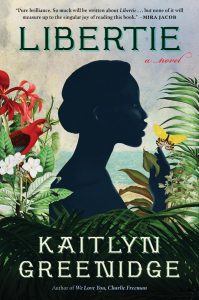 Libertie, by Kaitlyn Greenidge
Libertie, by Kaitlyn Greenidge
This epic book shares the story of Libertie Sampson, a young, free black woman living in Kings County, New York, in the 1860s. We join her finding her own path in the world, climbing out from under her mother’s all-consuming love, which manifests as fierce control of her daughter. Libertie’s mother is a talented doctor, who we meet as she ‘raises a man from the dead,’ awakening him from an induced slumber to escape slavery’s clutches, both literally and psychologically. Libertie doesn’t realise how much she’s in her mother’s thrall and is constantly seeking her approval, studying hard and winning a place at medical school so eventually the pair can work as Dr Sampson and Daughter – but is that what the young woman actually wants? The book is threaded with clenched-jaw moments of racist injustice for Libertie, who faces colourist attitudes on all sides, whether within an all-Black community or treating the white women who seek out her mother’s expertise. Still, she surges forward, reaching for freedom and forging her own life rather than the one her mother has determined on her behalf. Though the book spans decades and travels across America, Greenidge’s skill at writing gives the tale an intimate, familial feeling. Like the homeopathic remedies handed out by Libertie’s mother, this is a tale of seeking balance – between mind and body, dreams and reality, trauma and peace – and mothers and daughters.
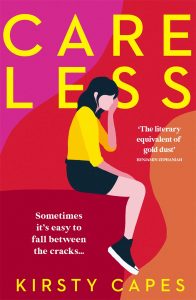 Careless, by Kirsty Capes
Careless, by Kirsty Capes
Brilliantly visceral and energetic from the off, Careless opens with 15-year-old protagonist Bess in a grotty chip shop toilet, about to take a pregnancy test. Though Bess’ foster parents live next to Shepperton Studios, her life is no movie. She imagines her ‘Boy’, the father of her possible child, climbing through her bedroom window to save her, and likens their ‘meet-cute’ to those of cinematic greats, yet she’s got her eyes wide open to the harsh reality (he steals her bike on their first encounter), and their relationship is definitively “not a love story”. Bess is a keen film photographer, constantly capturing the world around her on celluloid as if she needs physical proof of her perspective on life. It backs up her sense of self-worth: this is how she sees the world, this view matters. She dreams of a future as a filmmaker, creating documentaries about her friend Eshal, who’s set on career as a vet but terrified at the prospect of an arranged marriage. Bess’ little sister ‘Riss’ – her foster parents’ biological and favourite daughter – is annoying, and her social worker is hopeless. But are these thoughts actually the truth, or just her stubborn-yet-heartbroken take on the situation? Author Kirsty Capes is an advocate for better representation of care-experienced people in the media – and this book deserves all the awards it will no doubt receive.
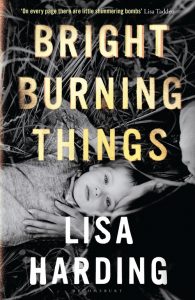 Bright Burning Things, by Lisa Harding
Bright Burning Things, by Lisa Harding
Once a talented ingenue taking London’s stages by storm, we meet Sonya Moriarty five years on from her brief moment in the spotlight. She’s stricken with an alcohol addiction and desperately trying to outrun the voices in her head – including the beautiful and unconditional love from her four-year-old son Tommy and dog Herbie. She has pitted the three of them against the world, weaving compelling but dangerous fantasies about the motives of others and pushing away offers of help based on her own childhood trauma. A near miss with a kitchen fire while she’s black-out drunk causes the neighbours to alert Sonya’s father, who forces his daughter into rehab. Sonya struggles with an unnamed ‘condition’; emotion crashing through her like gales, and seeing events through her eyes is both exhausting and exhilarating. The almost-modernist prose becomes freeform in places, and following Sonya’s train of thought – especially when she’s drunk – requires a combination of close focus and total surrender. Yet in the middle of these maelstroms are searing moments of insight and self-awareness. Readers may find themselves torn between judging Sonya’s bad behaviour and brought to tears with sympathy for the anguish she experiences on her journey to steadier ground. A heartbreaking book that’s painfully funny in parts.
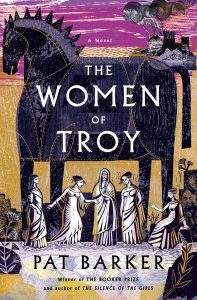 The Women of Troy, by Pat Barker
The Women of Troy, by Pat Barker
We’re straight back to the beaches of Troy for Barker’s second book in this series, which revises the Homerian epic from the perspective of the lesser characters – particularly the women – who are all too often silent in these histories. The story opens at the nail-bitingly cinematic pivot point of the ten-year Trojan War, where the wooden horse containing Achaean fighters is wheeled inside the city gates. We’re given a glimpse of what really occurs at the death of Priam, the King
of Troy, before the “exploits run from mouth to mouth and no doubt grew in the telling”. We also return to Agamemnon’s camp and the mind of Briseis, once a minor royal, now enslaved alongside the other women whose communities fell to these rampaging armies. She is pregnant, carrying the child of now-dead Achilles, and was swiftly married to his ally, Lord Alcimus, upon the warrior’s death. It has made her a free woman – saving her from a position stuck on the lowest possible rung of the ladder and giving her the ability to move around the camp. Despite victory, the Achaean forces are trapped on the beaches by the winds, with no hope of returning home. Resentment builds among the army with every day that passes. Yet, with King Priam’s rotting body lying unburied, dishonoured on the dunes, will the Gods ever allow them to return home? Barker expertly balances the domestic with the divine, giving us more of her addictive, alternative accounts
of the Greek mythology canon. Although Troy’s siege is said to have happened over three thousand years ago, hearing Briseis’s innermost thoughts, fears and hopes make the events feel timeless – which is how you know this series deserves its inevitable status as a modern classic.
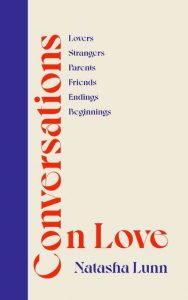 Conversations on Love, by Natasha Lunn
Conversations on Love, by Natasha Lunn
What’s the digital equivalent of ‘well-thumbed’? I highlighted so many passages in my copy of this book that entire pages were coloured in, rendering the exercise almost pointless. I even took photos of my Kindle screen, saving snippets of Lunn’s most poignant words – and intend to buy lots of copies for lots of people when this incredible book is published in the summer. Based on her wildly popular series of email newsletters, Lunn’s Conversations on Love – like all brilliant works – has a simple concept at heart. The writer questions celebrities, experts and those with first-hand knowledge of love on their experiences of the much-sought connection, from parenting through to platonic relationships. She asks: how do we find love? How do we sustain it? And how do we survive when we lose it? This book is beautiful, completely reassuring and tear-provokingly insightful. It’s a perfectly timed read for anyone establishing their post-pandemic priorities.
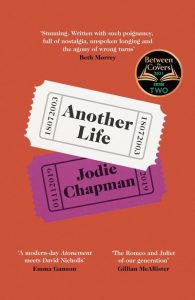 Another Life, by Jodie Chapman
Another Life, by Jodie Chapman
Fans of David Nicholls and Hanya Yanagihara will fall completely head over heels for the entwined tales of Anna, Nick and his brother Sal – beautifully rendered and weighed down by tragedy in this extraordinarily well-crafted debut novel. The opening chapter starts us off with hand-to-mouth heartbreak – and the story’s intensity only builds further. Chapman has a brilliant talent for creating vignettes, neatly bringing elements together like a skilled film director. You really get the sense that every tiny aspect has been thoughtfully considered, readers instantly connecting with her characters, snapping their desires into perfect focus. The narrative jumps around in time, giving us faded, fond memories of the past before whipping us back to the cold, hard present, before returning us once again to filtered recollections of what once was, slowly bringing the characters’ tales together. Nick turns each memory over in his mind, handling them like precious stones, and looking for new facets through which to understand events. At one point he says of a day with Anna that the memories were “like a movie montage. Not quite real, a little cliche, all the best bits. Maybe the words weren’t spoken exactly like I remember, but you get a sense of it, and what really do we ever possess of another human being but a sense of them?” This sweeping, cinematic love story is perfect to lose yourself in on a warm summer’s day – bring tissues.
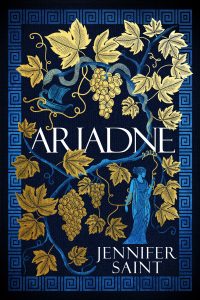 Ariadne, by Jennifer Saint
Ariadne, by Jennifer Saint
Here’s another welcome opportunity to escape to ancient Greece for a retelling of a classic myth from the perspective of the long-silent female characters. This time, it’s Ariadne’s tale of woe that gets dragged out of the labyrinth into the scorching Cretan sunshine for a closer, more informed look. Author Jennifer Saint does not hold back in this, her debut novel, recounting the familiar tale of Theseus and the Minotaur through the eyes of Ariadne and her sister Phaedra. What would it actually have been like to have such a creature for a little brother? How could their mother Pasiphaë ever recover from giving birth to a monster that was half man, half bull? And why would Theseus abandon the woman who had just turned her back on her family and people to help slay the Minotaur and escape? Brilliantly imaginative and totally engrossing from the start, Saint creates whole worlds where ancient texts only shared sentences, shining light into the shadows where the women were shoved, while making readers raise eyebrows at the cruel gods and the men who act in their name. Very pleasingly, Saint is already working on another retelling of a Greek myth – it can’t come soon enough.
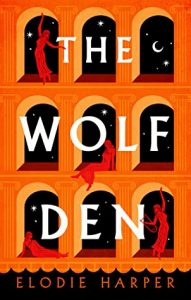 The Wolf Den, by Elodie Harper
The Wolf Den, by Elodie Harper
At first, the unflinchingly explicit and brutal world in which we meet Amara, enslaved in ancient Pompeii’s most notorious brothel, is almost too shocking to bear, but the doctor’s daughter quickly hardens against the grim reality of her new existence. Packed with historical detail without becoming educational, this is a gripping and compelling tale of humanity, and the powerlessness and resourcefulness of women in the ancient world. We experience life in pre-eruption Pompeii through the eyes of Amara and the other ‘She Wolves’ – prostitutes owned by sadistic pimp Felix, who will stop at nothing to get every last denarius from his purchases. Their situation seems hopeless, yet by using her quick mind and the talents of another ‘lupa’ named Dido – a noble-born woman sold into slavery following family misfortune – she starts to see the first glimmers of hope for a new life. But theirs is a fragile existence, in which everything can be taken away at a moment’s notice, including life. Impossible to put down and taut with tension up to the last page, this is a deeply affecting book that confronts questions of power, control, free will, and the timelessness of our most basic instincts.

